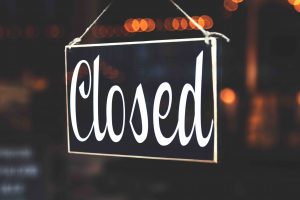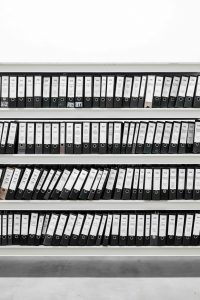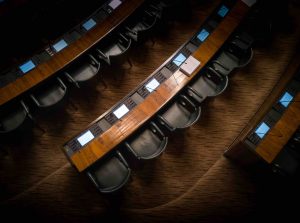 The partial shutdown of the federal government has been going on for almost five weeks as of the date of this article. Many government programs have been negatively impacted. This is especially pertinent regarding whistleblower (also known as qui tam) actions since the federal government is potentially involved in so many of the steps of prosecuting a successful lawsuit. Furthermore, the lack of government funding that has resulted from the shutdown may also increase the potential for more fraudulent acts that are the impetus for qui tam actions in the first place.
The partial shutdown of the federal government has been going on for almost five weeks as of the date of this article. Many government programs have been negatively impacted. This is especially pertinent regarding whistleblower (also known as qui tam) actions since the federal government is potentially involved in so many of the steps of prosecuting a successful lawsuit. Furthermore, the lack of government funding that has resulted from the shutdown may also increase the potential for more fraudulent acts that are the impetus for qui tam actions in the first place.
Federal Courts
The status of the federal court system is important when considering federal qui tam actions. This is because the lawsuits are based on a federal law, the False Claims Act, wherein a whistleblower (known under the law as a relator) brings a lawsuit on behalf of the federal government in cases in which businesses have brought false claims to the government for payment. As such, these lawsuits are almost universally brought in the appropriate federal District Court. In the San Francisco area, the United States District Court for the Northern District of California is the most frequent venue for filing qui tam actions. Luckily, for relators, at least, on January 11, Chief Judge Hamilton issued an order providing for the continuation of operations under the Anti-Deficiency Act (see the Order here). Simply put, this means the Court will continue to accept filings, hear, and decide cases without interruption and handle new and existing cases as necessary. This means that, for the Court, at least, the business of justice will continue unimpeded.
![]() Whistleblowers were given that name because they are essentially “blowing the whistle,” or alerting government officials of fraud committed against the government. Both the federal False Claims Act and the California False Claims Act provide great protection to whistleblowers and often, even compensation for bringing the fraud to light.
Whistleblowers were given that name because they are essentially “blowing the whistle,” or alerting government officials of fraud committed against the government. Both the federal False Claims Act and the California False Claims Act provide great protection to whistleblowers and often, even compensation for bringing the fraud to light.  Healthcare Fraud Lawyer Blog
Healthcare Fraud Lawyer Blog


 Nearly every lawsuit or legal action has a statute of limitations. A statute of limitations is the time limit within which the plaintiff, or person filing the lawsuit, can file a claim. Personal injury lawsuits in California have a statute of limitations of two years. Even criminal cases have a statute of limitations, although these will vary depending on the type of crime committed.
Nearly every lawsuit or legal action has a statute of limitations. A statute of limitations is the time limit within which the plaintiff, or person filing the lawsuit, can file a claim. Personal injury lawsuits in California have a statute of limitations of two years. Even criminal cases have a statute of limitations, although these will vary depending on the type of crime committed.  People make mistakes in the course of their job every day. When those ‘mistakes’ are intentionally made by a physician or health care billing administrator, though, they are considered fraud. The U.S. Department of Justice (DOJ) has spent the last few years cracking down on health care fraud, with the help of whistleblowers.
People make mistakes in the course of their job every day. When those ‘mistakes’ are intentionally made by a physician or health care billing administrator, though, they are considered fraud. The U.S. Department of Justice (DOJ) has spent the last few years cracking down on health care fraud, with the help of whistleblowers.  Those who are under investigation for health care fraud may face years in federal prison if they are found guilty, or they ay face civil charges that result in much less severe penalties. It is up to the discretion of the federal prosecutor to determine if the case will be criminal or civil. If you have come forward to report health care fraud, how do you know whether those you have turned in will face criminal or civil charges?
Those who are under investigation for health care fraud may face years in federal prison if they are found guilty, or they ay face civil charges that result in much less severe penalties. It is up to the discretion of the federal prosecutor to determine if the case will be criminal or civil. If you have come forward to report health care fraud, how do you know whether those you have turned in will face criminal or civil charges? The partial shutdown of the federal government has been going on for almost five weeks as of the date of this article. Many government programs have been negatively impacted. This is especially pertinent regarding whistleblower (also known as
The partial shutdown of the federal government has been going on for almost five weeks as of the date of this article. Many government programs have been negatively impacted. This is especially pertinent regarding whistleblower (also known as  Many people are familiar with whistleblower lawsuits (often called
Many people are familiar with whistleblower lawsuits (often called  Recently, the Supreme Court requested that the Department of Justice (DOJ) file a brief regarding a qui tam or whistleblower lawsuit brought under the False Claims Act (FCA) as regards a clarification of what, in fact, constitutes a “material” misrepresentation under the law. The response from the DOJ is controversial, to say the least.
Recently, the Supreme Court requested that the Department of Justice (DOJ) file a brief regarding a qui tam or whistleblower lawsuit brought under the False Claims Act (FCA) as regards a clarification of what, in fact, constitutes a “material” misrepresentation under the law. The response from the DOJ is controversial, to say the least. Federal law allows for whistleblowers to file lawsuits against individuals or companies that are defrauding the government. A lawsuit of this nature is called a whistleblower or a
Federal law allows for whistleblowers to file lawsuits against individuals or companies that are defrauding the government. A lawsuit of this nature is called a whistleblower or a  On December 21, 2018, the Department of Justice released its statistics for Fiscal Year 2018 for actions taken under the Federal False Claims Act. The
On December 21, 2018, the Department of Justice released its statistics for Fiscal Year 2018 for actions taken under the Federal False Claims Act. The  The Occupational Safety and Health Act was passed in 1970 and created the Occupational Safety and Health Administration (OSHA) to protect employees from dangerous working conditions and to standardize workplace safety. Over the years, it has been amended many times and now includes provisions that protect employees from retaliation from their employers when they either report injuries under the OSHA reporting requirements or if they file a complaint against their employer for a violation of OSHA standards. Many states have a state version of OSHA and, in the case of California, have state laws that prohibit retaliation against whistleblowers, as well.
The Occupational Safety and Health Act was passed in 1970 and created the Occupational Safety and Health Administration (OSHA) to protect employees from dangerous working conditions and to standardize workplace safety. Over the years, it has been amended many times and now includes provisions that protect employees from retaliation from their employers when they either report injuries under the OSHA reporting requirements or if they file a complaint against their employer for a violation of OSHA standards. Many states have a state version of OSHA and, in the case of California, have state laws that prohibit retaliation against whistleblowers, as well.